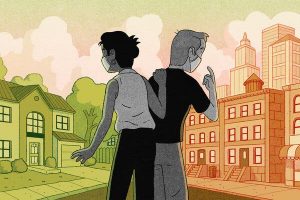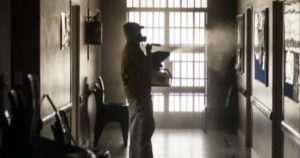COVID-19 vaccines are right around the corner, and with travel being one of the main concerns about spreading the coronavirus, the federal government could require that travelers be vaccinated before boarding trains, planes and buses.
Pending a Food and Drug Administration advisory panel hearing on Thursday, Pfizer’s vaccine candidate could start being rolled out to health care workers next week, with hopes for mass inoculations by summer. At least one-third of Americans don’t plan on being vaccinated, according to polls, and the government can’t inoculate people against their will. But not getting a vaccine could prevent them from traveling.
There may be a statutory basis for the president to unilaterally enact a general vaccine mandate, Lawrence Tribe, a professor at Harvard Law School, told Newsweek in May, but it’s more likely to come from an act of Congress. Dorit Reiss, a University of California Hastings College of Law professor, told Newsweek Congress’ ability to require a vaccine to travel comes from the power to regulate interstate commerce.
Christopher Robertson, a law professor at Boston University, and James Rogers, a law professor at the University of Arizona, said if Congress doesn’t act, the Federal Aviation Administration may be able to set a regulation. In a 2016 paper published in the American Journal of Law and Medicine, they noted that Congress gave the FAA the authority to “prescribe regulations and minimum standards for practice, methods, and procedures the Administrator finds necessary for safety in air commerce and national security.”
Although the FAA hasn’t required vaccines for passengers in the past, Robertson and Rogers said it may have “sufficient authority” to institute a mandate.
Airlines are already considering vaccine regulations. Alan Joyce, CEO of Qantas Airlines, the national carrier of Australia, told Nine News on November 23 that the airline would require some travelers to be vaccinated before boarding flights.
“Whether you need that domestically, we will have to see what happens with COVID-19 in the market. But certainly, for international visitors coming out and people leaving the country, we think that’s a necessity,” Joyce said.
Sodium chloride is added to a vial of the Pfizer/BioNTech COVID-19 vaccine at Guy’s Hospital in central London on Tuesday. Congress would likely be able to require vaccination to travel, according to experts, because of its ability to regulate interstate commerce. Victoria Jones/POOL/AFP/Getty
Joyce added that he thinks it’ll be a “common theme” among airlines, and Reiss predicted some countries might implement requirements for international travelers. Some countries in Africa, Europe and South America already require yellow fever certificates for travelers, so such a move is not unprecedented.
In America, Reiss said, the federal government would be well within its rights to require international travelers to be vaccinated, because it has the power to control the borders. The Public Health Service Act gives the Department of Health and Human Services secretary the ability to take measures to prevent the entry and spread of diseases from foreign countries into the United States.
The federal government may be able to impose a mandate, but a requirement does little without the ability to enforce it. The practicality of such a mandate, Reiss said, will be more challenging than the legality of it.
“We require an ID for flying, so you may say you need to show your vaccine document,” Reiss said. “But paper isn’t very durable. So maybe everybody has to have a [mobile] application or a paper, and that raises questions about privacy.”
Any mandate is likely to come with a medical exemption, which Reiss said raises the question of whether any doctor should be able to sign off on the exemption. Another exemption legislators would have to consider is a religious one. That exemption may be even harder to enforce because it’s difficult to prove.
“You can’t say give me a letter from your priest, because that discriminates against people without organized religion,” Reiss said. She noted that one option would be for legislators to assume people are telling the truth and accept all claims.
If a vaccine mandate is put in place, Tribe said in May, it’s “almost certain” the federal government would have a statute or regulation to back up the requirement. However, it’s also likely a vaccine travel mandate would face legal challenges.
Reiss “probably wouldn’t” challenge the mandate, she said. But if she were to, the first point she would challenge is that it goes beyond Congress’ power under the Constitution’s Commerce Clause and that it infringes on the right to travel.
A lawsuit challenging the mandate would also likely point to an infringement on personal liberty, but Reiss noted the argument would run into the issue in the Supreme Court’s Jacobson v. Massachusetts decision. The court’s ruling in that case set a 115-year precedent that says individual liberty in the case of a vaccine doesn’t trump the need to protect the public.
Both the Pfizer and Moderna vaccine candidates are at least 90 percent effective, and government and public health officials consider a vaccine to be one of America’s best paths toward normalcy. While it could be key to keeping businesses and restaurants open and resuming large gatherings, people remain skeptical about vaccination.
About one-third of respondents weren’t confident an approved vaccine will have been properly tested for safety and effectiveness, an Associated Press-NORC Poll released on Wednesday found. A similar percentage, about 27 percent, of the 1,17 adults surveyed said they don’t plan on being vaccinated.
With herd immunity being key to curbing the spread of infectious diseases, Robertson and Rogers argued in their paper that a traveling mandate could motivate a “substantial” number of people to get vaccinated because “the benefits of airline travel are so great.”



















